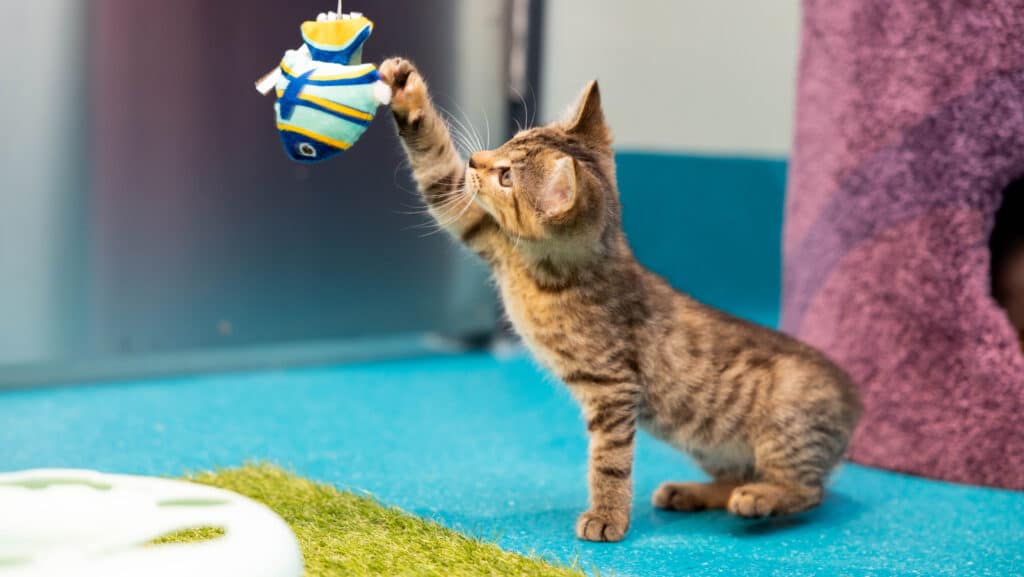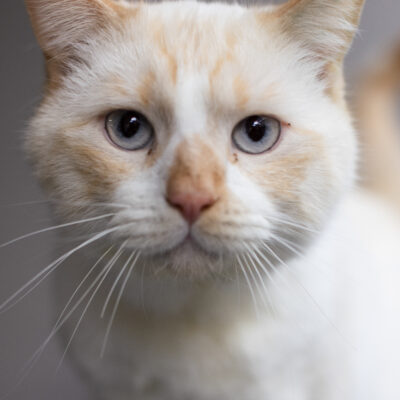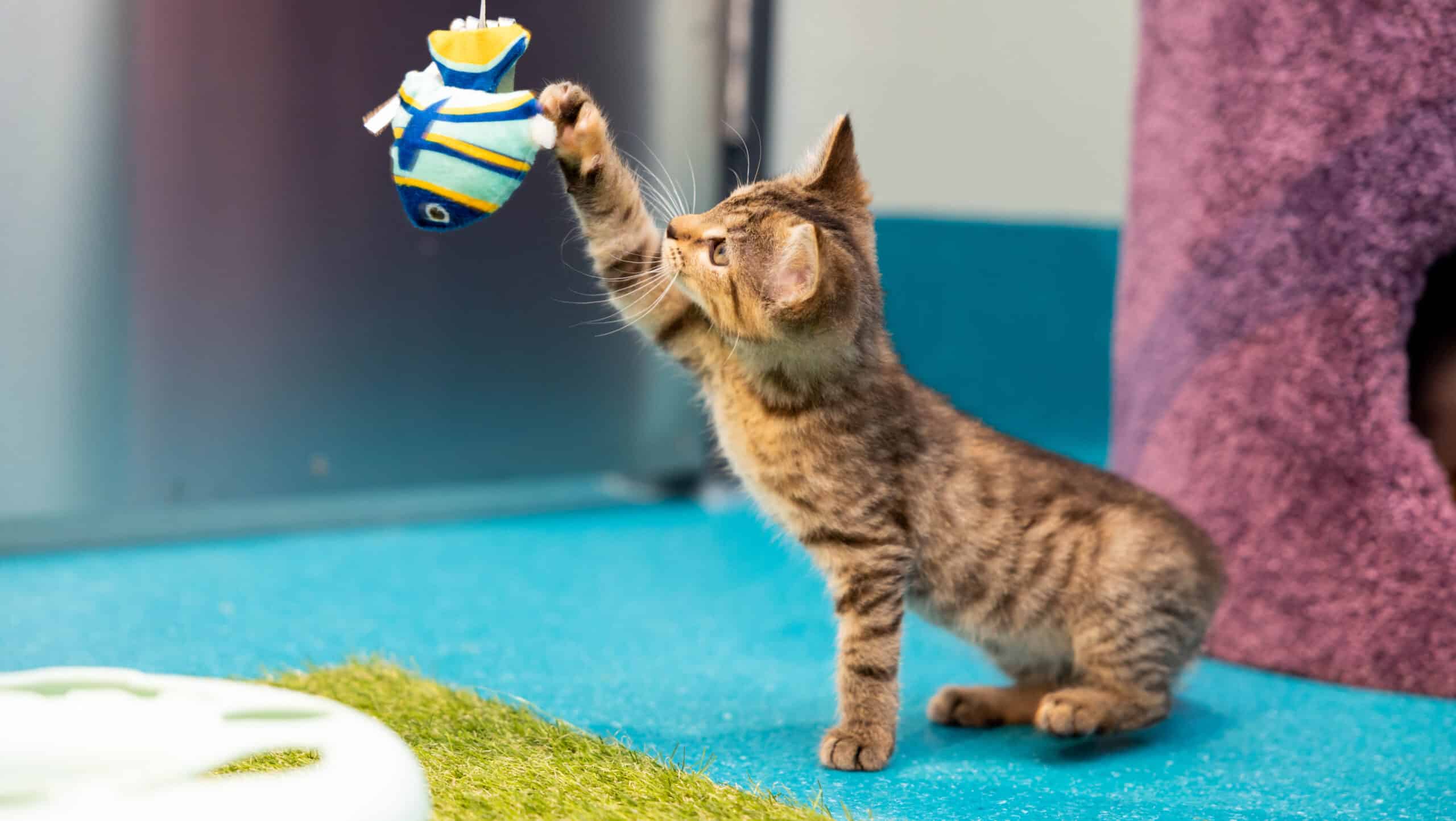Home > Information and Advice > Caring for Animals > Caring for Cats and Kittens
To prepare for adopting a feline companion or to ensure your cat’s needs are being met, make sure you can provide your cat with regular health checks, exercise, enrichment, and a well-balanced diet. RSPCA NSW offers up-to-date expert advice on everything from bathing and grooming your cats to guidance on nutrition and veterinary care.
Though taking care of your feline friend can be a huge responsibility, bonding with a cat can be an incredibly rewarding experience. If you’re looking to adopt a feline friend of your own, consider rescuing a cat or kitten from RSPCA NSW.
In NSW, you are legally required to have your cat microchipped and registered. They should also wear a collar with a tag which lists your contact details. Registration costs will vary, depending on whether your cat is desexed. If you move, remember to update your details with your local council. If you have any queries regarding registration or updating your details, please contact your local council for additional information.
While RSPCA NSW strongly advocates for keeping cats safe at home, your feline companion is still allowed to roam outdoors. If your cat enjoys spending time outside, we recommend putting a bell on their collar, as this will make them easier to find and warn birds and other animals that your feline friend is around.
For general health checks, and to ensure their vaccinations are up to date, your cat will require annual visits to a veterinarian. You will also need to regularly treat your cat at home for fleas and worms. Be sure to read the label to confirm that your chosen medication is safe for cats and that you are using it correctly. It’s also important to give your cat something to clean his teeth. You can do this by feeding him dental care biscuits or a raw chicken wing each week.
Some common household plants are toxic to cats. Flowers, lilies in particular, might look great in a vase or bouquet, but they are extremely toxic to cats and can be fatal if ingested. Take the time to familiarise yourself with the range of toxic plants, remove them from your garden or house, or take precautions to prevent your cat from accessing them.
Any changes in behaviour, defecation, drinking, eating, urination, or significant weight loss or gain should be checked out with a visit to a veterinarian or veterinary hospital. Today, there are many treatments available for a wide array of problems; even with conditions such as arthritis and diabetes, your veterinarian can advise you on the steps you can take to provide your animal companion with a safe and happy life.
RSPCA NSW Veterinary Hospitals can provide high quality care and support for you and your dog. From routine veterinary health checks to specialised surgeries, our veterinary teams can help you provide your dog with emergency treatment and essential support.

Cats who receive enrichment lead happier, healthier lives, which is why it’s so important to keep your feline friends entertained. Enrichment activities are essential in maintaining a cats’ wellbeing, as they allow them to express natural predatory behaviours like following scents, stalking, chasing, and pouncing without putting themselves or other animals at risk of harm.
Proper enrichment is achieved by engaging your cat’s five primary senses: touch, taste, hearing, vision, and smell. It is also the key to creating a welcoming home environment, especially for feline lovers who want to keep their cats safe at home. The benefits of enrichment can be surprisingly far-reaching, from reductions in stress and anxiety to reducing the risk of behavioural issues. Cats can be very independent, but many enjoy company and playtime. You’ll soon discover that your cat’s favourite activities will be the ones that involve you!
Providing enriching experiences for your cat shouldn’t cost you a lot of time, effort, or money. From puzzle toys and food games to DIY projects, there are many simple and easy ways to stimulate your cat’s body and mind.

Unlike dogs, cats aren’t required to undergo extensive training. However, many cats enjoy learning experiences and, like their canine counterparts, can be trained or taught tricks (e.g., sitting on command).
Cats naturally have an instinct to bury their excrement, so most won’t need to be litter trained. However, kittens who are unable to stay with their mother in after their birth may require some help, like being placed in their litter tray within half an hour of having a meal.
If your cat stops using his litter tray properly, please contact your veterinarian, as there may be a medical or behavioural issue they can help with.


When cats groom themselves, they can ingest some of their own fur, resulting in fur balls in their stomach. Because of this, regularly brushing and grooming your cat is essential. If you establish this habit early in your cat’s life, it can become an enjoyable activity and provide routine bonding time.
Long-haired cats will usually need grooming at all times of the year to avoid their hair becoming matted and your home becoming covered in fur. As not all long-haired cats will allow themselves to be brushed, some may require the help of your veterinarian and be sedated for clipping. Although short-haired cats don’t require as much grooming as those with longer coats, they can still enjoy being brushed.
Speak to your veterinarian about the best way to clean and groom your cat. You will also need to provide your cat with a scratching post to keep his nails in good condition and remove fragments of his old nails.
At RSPCA NSW, we advocate for keeping cats safe at home, where they will be less likely to be exposed to cruelty, be involved in car accidents, catch diseases, or sustain serious injuries from fighting other cats. Keep your indoor cat happy by ensuring he has a nice sunny spot to lie in, providing interesting plants like cat grass to engage their primary senses, and having toys and scratching surfaces readily available.
Your cat will also need access to a clean drinking water and a litter tray, which must be cleaned regularly. RSPCA NSW recommends having one extra litter tray per cat to reduce ‘accidents’ and marking.
If you do allow your cat to roam, we recommend keep them inside or in an appropriate cat enclosure between dusk and dawn, as this is when most predation occurs.


Before taking home a new forever friend, take some time to learn about the needs and history of their breed.
Your cat’s breed can affect a range of different characteristics, so make sure you’re prepared to match with a cat that fits your lifestyle and level of animal care experience. For example, Bengals are extremely active and intelligent, and will therefore require plenty of engagement and enrichment.
Some breeds have inherited health problems that require veterinary intervention, meaning you might incur ongoing costs depending on your animal’s needs. Remember that although caring for a cat can be an incredibly rewarding experience, it is also a long-term commitment and a huge responsibility.

Though cats still rely on us to feed them and keep them safe and entertained, a healthy, happy feline friend can be the key to the purr-fect home!

Cats are carnivorous animals, meaning they require high quantities of animal proteins and fats. It is important to provide your cat with high-quality, premium commercial food that is appropriate for their life stage and health status. Cats also readily enjoy eating fresh human-grade raw meat and meaty, uncooked bones.
If treating your cats to raw meat and bones, provide them only with human-grade raw meat and uncooked, meaty bones. Some pet meat, bone products, pet mince, and pet rolls can contain preservatives that can be detrimental to your cat’s health. For example, sulphite preservatives can induce a thiamine deficiency, which may prove fatal for your cat.
Many human foods can cause health complications and illness in your cat, so avoid giving them:
Liver is rich in iron but can become addictive, and can also cause disease due to high amounts of vitamin A. And, although many cats love fish, do not feed them this exclusively, as a fish-only diet can result in dietary deficiencies. In fact, cats have unique dietary requirements regarding certain vitamins, fatty acids, and amino acids such as taurine, which can only be supplied by animal tissue (i.e., meat). These requirements must be included to keep your cat healthy and happy.
Adult cats tend to graze, preferring to eat several smaller meals throughout the day and night. We also recommend providing them with meals that take a while to chew (such as raw chicken wings).
When adopting a kitten, they will typically be at least eight weeks old. This is because it’s best for litters to remain under their mother’s care until they are at least this age. However, there can be times when it’s necessary to separate a litter from their mother earlier than this. For example, a mother cat may reject her litter, refuse to feed them, or become unable to due to an illness like mastitis.
If you’re caring for kittens who are not nursing, you’ll need to feed them special kitten formula four times a day. Please note that this is different to supermarket-purchased ‘kitten milk’. When your kittens are approximately six weeks old, they can then be weaned onto solid dry or tinned kitten food. You’ll need to feed them this three times daily until they are 10 months old.
Once your kitten is 10 months old, you’ll need to feed them either once or twice a day (depending on their energy levels) so they can continue to maintain a healthy weight.
Remember that cats are obligate carnivores and need a balanced, high-protein diet to stay healthy. You will need to ensure your kittens:
At RSPCA NSW, we love cats and helping people care for their furry friends! We believe that every cat deserves a safe and permanent home, away from the elements, and under the protection of a family who cherishes and loves them. That’s why we developed our Keeping Cats Safe at Home campaign, to educate and mentor cat carers and encourage them to keep their feline friends safe and enriched at home.
If allowed to roam outside, your cat may be vulnerable to a variety of risks (like sustaining an injury from cars) or damage your local community by preying on native wildlife. For purpose-built resources on creating a home where your cat can feel loved, stimulated, and engaged, you can contact our Keeping Cats Safe at Home team at safecats@rspcansw.org.au.
Emergency preparedness is an essential part of caring for any kind of animal. Including your cat or kitten in your household’s emergency and evacuation plans is essential to ensuring the safety of your beloved forever friends. Taking the time to prepare inclusive, comprehensive plans can make all the difference in the world.
RSPCA NSW’s Ready Pet Go Emergency Pack includes a step-by-step guide to help you prepare for crisis situations with your animals’ safety in mind. Having an emergency kit prepared will greatly increase the likelihood of safely evacuating your animals during crisis situations. Your emergency kit should include any items that will help you transport and care for your animal should the need to evacuate arise. This includes:
As the leading animal welfare organisation in the state, RSPCA NSW helps keep communities and animals safe during times of crisis. Our Emergency Response Team is central to our mission, ensuring the safety of people and animals in flood and fire-affected areas.
We promise to uphold the highest ethical standards. Your personal information has never been, and never will be sold or traded to other charities. This is our promises to you.



We acknowledge the Traditional Owners of the lands on which we live and work. We recognise and respect the enduring relationship they have with their lands and waterways, and particularly acknowledge the vital role animals have played in Indigenous life, stories and culture for tens of thousands of years.
The RSPCA is an independent, community-based charity providing animal care and protection services across the country.
This site is protected by reCAPTCHA and the Google Privacy Policy and Terms of Service apply.
The RSPCA is an independent, community-based charity providing animal care and protection services across the country.


This site is protected by reCAPTCHA and the Google Privacy Policy and Terms of Service apply.